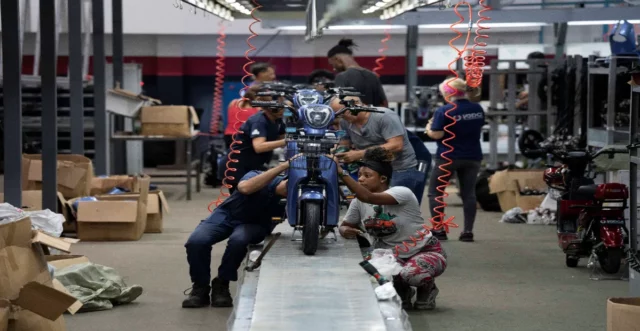Cubans are now able to find their way quickly and quietly on electric scooters in Havana which is famed for the colorful vintage cars.
These electric scooters are made with Chinese parts. Cubans are confident that all transportation will be electric in a few years.
“Electric motorcycles are solving a lot of problems in Cuba, they are already used for almost everything,” explains Omar Cortina, a Cuban hotel worker who recently purchased his first electric vehicle – a lime-green scooter powered by a lithium battery.
Until recently, Cuba’s roads had changed little in the six decades since former leader Fidel Castro’s 1959 revolution: the old cars puffing sooty exhaust, rutted pavement, light traffic.
Now, electric vehicles are proving a blessing for many in the communist-run nation.
Between 2020 and 2022, the last year for which figures are available, Cuba-based companies produced more than 23,000 electric vehicles, according to official data.
Since then, demand has grown, alongside an economic crisis that has slashed both fuel supply and public transportation.
Fuel for combustion-powered engines has for years been scarce in Cuba – prompting hours-long or sometimes days-long queues.
And a five-fold price hike earlier this year means a typical 40-liter tank of gas costs more than a state-worker’s average monthly wage, far out of reach for most.
Public transportation is hardly more palatable.
Buses in the Havana area are far fewer – and more crowded and uncomfortable – than in previous years. And half the routes to points outside the capital have been eliminated this year as fuel and spare parts dwindle.
Those dire circumstances have helped drive demand for the products of newly formed companies like Caribbean Electric Vehicles (Vedca), said company director Julio Oscar Perez.
The firm, a joint venture between Chinese investor Tianjin Dongxing Industrial and Cuban state bicycle manufacturer Minerva, has produced more than 2,000 scooters, bikes and mini-tricycle trucks in Cuba with Chinese parts.
“I think we’re reaching a tipping point,” Perez said in an interview.
“That is, not just seeing (electric vehicles) as an alternative to mobility, but also (solving) other problems that exist because of fuel limitations.”
On a recent weekday visit to the company’s plant outside Havana, some of Vedca’s 64 employees assembled plastic parts, soldered wires, and tightened bolts in an orderly assembly line.
Perez said that the company has also begun testing a new electric tractor and experimenting with other electric-powered heavy machinery.
Other small domestic companies sell electric bikes, ranging from makeshift to upscale. And the government recently authorized imports of far pricier electric vehicles – including Teslas TSLA.O – though few in Cuba can afford such luxuries.
For Cortina, just being able to get back and forth from work is enough of a selling-point.
(With Inputs From Reuters)
Delhi based journalist pickled in journalism. Have reported from nine world capitals and almost all parts of India. Over the last three decades, I have worked for India’s mainstream English dailies and contributed to All India Radio, Doordarshan and Women’s Feature Service. Also worked for international media including Japan’s leading newspaper, The Asahi Shimbun and done assignments for The Sunday Times, London, The Telegraph, The Guardian and the Canadian Broadcasting Corporation. Worked in the Embassy of France in New Delhi and can speak French to save my life. Write on Diplomacy, Politics and the social sector. Love Nature, heritage, Nature, animals and vintage cars. Enjoy cycling and playing badminton.





